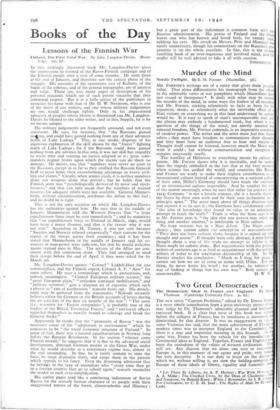Murder of the Mind
Nordic Twilight. By E. M. Forster. (Macmillan. 3d.)
MR. FORSTER'S writings are of a rarity that gives them peculiar value. That alone differentiates his monograph from the othen in the admirable series of war pamphlets which Macmillans have just issued at threepence.* It deals with what may be termed the murder of the mind, in some ways the foulest of all murders, and Mr. Forster, sticking relentlessly to facts as basis for his argument, shows as relentlessly what the inevitable effect of a Nazi victory on everything we in this land understand by culture would be. It is easy to speak of man's unconquerable soul, and the phrase may embody a fundamental truth, but when it is a question of the things of the mind, not merely internal but external freedom, Mr. Forster contends, is an imperative condition of creative power. The writer and the artist must feel free them- selves ; they must have freedom to communicate their thought, and they must have an audience free to hear and receive it. Thought itself cannot be fettered, however much the Nazis may wish it could ; but without communication and reception it remains necessarily sterile.
The hostility of Hitlerism to everything meant by culture is patent. Mr. Forster shows why it is inevitable, and he under- lines the tragedy embodied in the fact that at the very momen when science has unified the world, and countries like Britain and • France are ready to make their highest contribution to an international culture instead of concentrating on a national culture of their own, Hitler's Germany should have made the existence of an international culture impossible. And he touches the root of the matter unerringly when he says that today (in contrast with, 1914) Germany " is not a hostile country, she is a hostile theory the Nazis by their own wish and by their own declaration are principle apart." The artist must above all things discover truth and express it as he sees it ; the Germans have condemned open:y " the idea of knowledge that found its value in an unimpeded attempt to reach the truth." Truth is what the State says it is as Mr. Forster puts it, " the idea that one person may enjoy on thing and another another," is intolerable to Nazi culture.
No hope remains but in a Nazi defeat. The Nazis cannot change ' • they cannot admit the conception of non-conformity. " They dare not leave culture alone, because it is mixed up with thought and action." If thought were only abstract, it men having thought about a way of life uncle no attempt to follow it, the Nazis might let culture alone. But acauaintance with the political writers of centuries ago is as fatal as acquaintance with the politica writers of today to the totalitarian dictatorship of life. So A.tt Forster reaches his conclusioa: " Much as I long for peace, I cannot see how we are to come to terms with Hitler. For one thing, he never keeps his word ; for another, he tolerates nol way of looking at things but his own way." Both reasons are


























 Previous page
Previous page